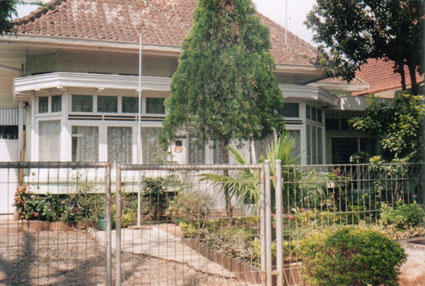My first internment camp
The truck that drove us from Sumber Sewu to Malang stopped in front of the Welirang street 43 A, a street I knew very well. Our luggage was put on the pavement and so my mother, Henny and I brought everything inside.
We received one room for the four of us, it didn’t look too bad in my eyes. Before the war, this house was from Mr. and Mrs. Hoogland, he was sent to a camp in Bandung . We were living with several families in this house, occupying all the rooms of Mrs. Hoogland’s pretty home. In the garage lodged Mrs.Borg a very nice German lady who married a Dutch man. She had an adorable little baby girl.
We all had to be very careful not to use too much water, when we took a bath or for our washing. We all had to cook on charcoal then wash our pots and pans in turns. Now and then there was some grumbling in the kitchen, but on the whole we were very pleased to have a place for ourselves. It was nice for my mother as well because now she had several women around her she could talk with, she was no longer lonely as on the plantation. A good point was, that my father also stayed in Malang, not faraway from our camp. He was still writing us but we couldn’t see or visit each other.
As for me, I was quite happy to be back in Malang, I had found some of my friends back , but I missed my father and I missed Sumber Sewu where I had felt so free, so happy.
Our camp “De Wijk” consisted of many houses with barbed wires all around the camp and some sentry-boxes with Japanese or Indonesian soldiers here and there, to take care that we didn’t try to escape. There were about 7000 women, children and a few men interned in “De Wijk” from Malang. The Japanese called the camp a protection camp against the Indonesians
who saw the Dutch as their “musuh” ( enemy). The Japanese used lots of propaganda against the Dutch Britisch, Australians and Americans. It worked, but mostly by the young and the very young Indonesians.
In the beginning there was a “pasar” ( Indonesian market) near one of the entries of our camp, there were Indonesian men but mostly women selling fruit and vegetables.
My mother still had a bit of money left, so she sent me to the “pasar”, because I could “tawar” (bargain) with the Indonesians about the prices. It is silly to pay the price that’s asked for, because that price is always far too high. To bargain is quite a sport, and I really had to bargain since my mother gave me just a little bit of money.
And then all of a sudden the entry to the “pasar” was closed. Gone were the friendly
Indonesian women, gone was all that delicious Indonesian fruit. Gone was the little bit of freedom, no more walking around on the market.
My mother asked me if I could fetch some milk and butter early in the morning for Henny and Jansje, twice a week. Not far from the Welirang street was a house used as a Camp-office where a small truck brought milk and butter for the people who needed this. My sister Henny needed it very badly and Jansje was still growing so she needed it as well. I sneaked through the dark streets around four in the morning because the Indonesian milk man came before five o’clock to the Camp-office. I often climbed in a tree so that nobody could see me and I was always the first one to be served.
Since more and more people had hardly any money left, the Japanese camp management organised a soup kitchen, one meal a day, the rest we had to buy in the camp shop.
Our camp De Wijk was in hands of the Japanese civilians, Japanese economists as they were called. That meant that there wasn’t a too strict policy towards the Dutch prisoners.
But Malang had a very strict and very cruel Kempeitai management, we all knew that we had to stay out of the hands of the infamous Kempeitai.
Sometimes we heard the most horrible stories from some Eurasians who were still outside the camps since they had Indonesian forefathers. Also the Indonesians were very scared of the Kempeitai. Malang became completely different from the town I once had known.

Welirang Street 43 A

